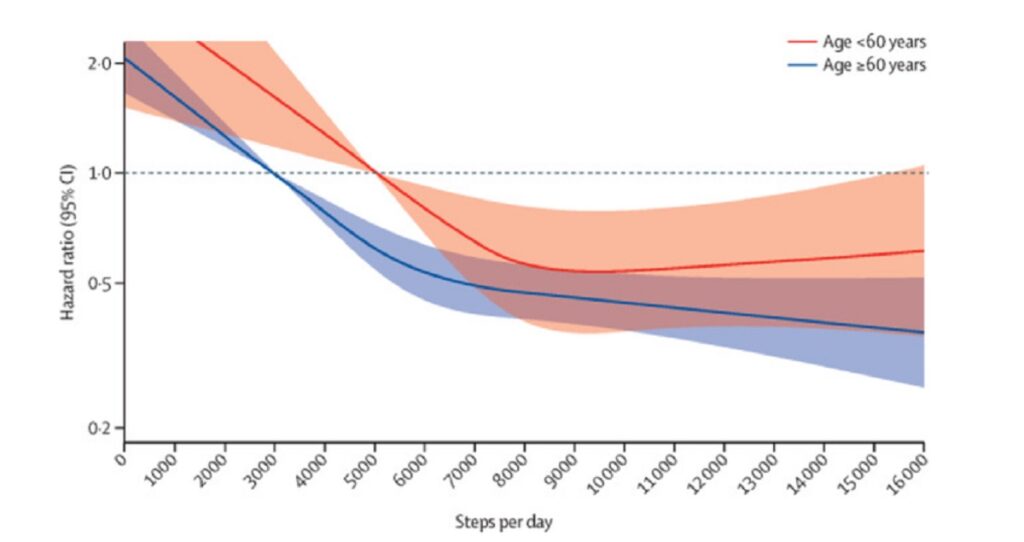For years, we’ve been told that 10,000 steps a day is the golden rule for good health. Fitness trackers, health experts, and even your favorite smartwatch have made this number a standard, but science is now showing that the real number might be quite different.
The 10,000 Steps Myth

The 10,000-step goal, now a well-accepted part of popular culture, originated in Japan back in 1965. A Japanese company released a pedometer called “Manpo-Kei,” which roughly translates to “10,000 steps meter.” The number was chosen because, in Japanese culture, 10,000 (万) is visually similar to a person walking. It wasn’t based on any scientific research, but the idea quickly caught on, and soon, 10,000 steps became the go-to target for daily physical activity.
Fast forward to today, and it’s a number that’s deeply ingrained in our fitness routines. But it turns out, this widely-accepted goal isn’t backed by science. Research has begun to debunk this myth, showing that the ideal number of steps for most people is far lower than 10,000.
Science Says 8,000 Steps Are Enough
A study published in JAMA revealed that 8,000 steps per day is the optimal amount for most people to see health benefits. The study concluded that while walking more than 8,000 steps didn’t necessarily provide extra benefits, it didn’t harm your health either. Essentially, walking more than that is not likely to give you any additional health advantages.
Moreover, walking consistently around 8,000 steps a day was shown to have a meaningful impact on health, particularly in terms of reducing the risk of disease and improving overall fitness. The study confirmed that the days of religiously hitting 10,000 steps are behind us. Instead, the key is finding a manageable and sustainable walking goal that works for you.
Age Matters: Different Goals for Different Decades
Interestingly, the ideal step count varies by age group, according to further research. A meta-analysis published in The Lancet revealed fascinating findings about how walking impacts different age groups.
For adults over the age of 60, the optimal step count was found to be around 7,000 steps per day. The study, which combined 15 separate studies and included over 47,000 participants, showed that people over 60 who increased their steps from 3,000 to 7,000 reduced their risk of mortality by 50%. However, walking more than 7,000 steps didn’t show any additional benefits— in fact, going over this number didn’t significantly decrease their mortality risk.
But here’s where it gets surprising: for younger adults (under 60), the health benefits continued up to 8,000 steps a day. Beyond that, walking more steps seemed to slightly increase the risk of mortality. This is a compelling finding because it suggests that for younger people, there’s a limit to how much walking is beneficial.
What Does the WHO Recommend?
While these studies suggest specific step counts, the World Health Organization (WHO) offers a different perspective. They focus less on the number of steps and more on the duration of physical activity. For adults aged 18-64, the WHO recommends at least 150-300 minutes of moderate aerobic activity, or 75-150 minutes of vigorous aerobic activity per week. They also recommend incorporating muscle-strengthening activities at least two days a week.
For people over 64, the recommendations don’t change much. However, the key takeaway is that physical activity, regardless of the form it takes, remains critical for overall health.
The Bottom Line: Walk, but Don’t Obsess Over the Numbers
So, should we abandon the 10,000-step rule altogether? Not necessarily. Walking is still one of the best exercises you can do, and aiming for 8,000 steps a day is a solid, achievable goal for many people. The important thing is to find a routine that works for you. Whether it’s walking, biking, swimming, or hitting the gym, staying active is the ultimate goal.
What these studies show is that we don’t need to obsess over hitting an arbitrary number like 10,000 steps. Instead, focus on moving more, staying active, and choosing a level that’s sustainable and beneficial for your personal health. And remember, every step counts—so keep walking!






